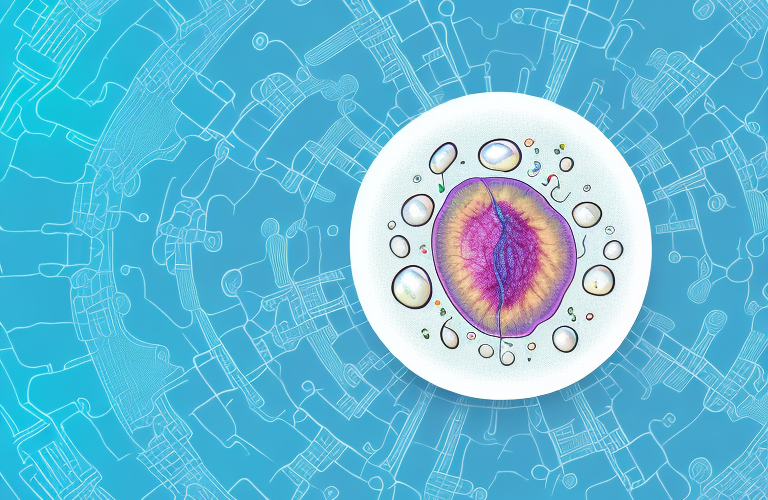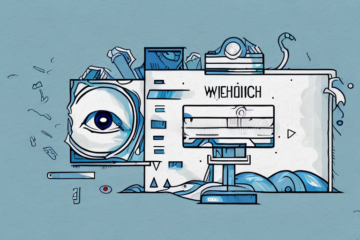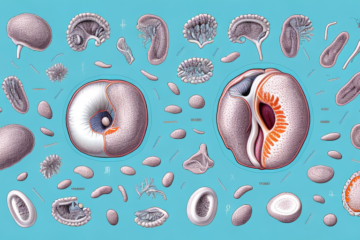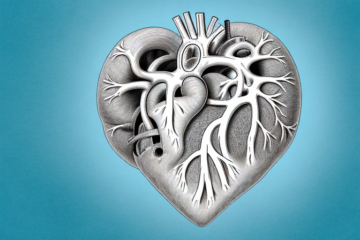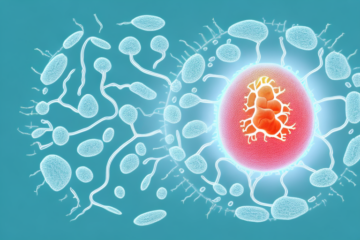Hyperoxaluria refers to a medical condition characterized by elevated levels of oxalates in the urine. High levels of oxalates can cause the formation of kidney stones, a common symptom of hyperoxaluria. In this article, we will provide an in-depth analysis of hyperoxaluria, including the symptoms, causes, treatment, and more. So, let’s get started!
Understanding Hyperoxaluria: An Overview
Hyperoxaluria is a rare genetic disorder that can lead to the accumulation of oxalates in the urine, which can develop into kidney stones. There are three types of hyperoxaluria, each with a different cause. Primary hyperoxaluria, the most severe type, is caused by a genetic mutation that affects the liver’s ability to degrade oxalates. Secondary hyperoxaluria occurs due to an underlying medical condition, while enteric hyperoxaluria arises as a result of specific gastrointestinal disorders.
While hyperoxaluria is a rare disorder, it can have a significant impact on a person’s quality of life. Symptoms of hyperoxaluria can include painful urination, blood in the urine, and recurrent kidney stones. Treatment options for hyperoxaluria vary depending on the type and severity of the condition. In some cases, dietary changes may be enough to manage symptoms, while in more severe cases, medication or surgery may be necessary. It is important for individuals with hyperoxaluria to work closely with their healthcare provider to develop a personalized treatment plan.
Types of Hyperoxaluria and Their Symptoms
Primary hyperoxaluria type 1 is the most severe type and symptoms usually appear in childhood. Symptoms include blood in the urine, frequent urination, bladder pain, vomiting, and kidney stones. Secondary hyperoxaluria develops as a result of another medical condition, such as inflammatory bowel disease or intestinal bypass surgery. Symptoms may include burning or pain during urination and the frequent urge to urinate. Enteric hyperoxaluria is usually associated with gastrointestinal disorders such as Crohn’s disease and ulcerative colitis. Symptoms include abdominal pain, diarrhea, and gastrointestinal bleeding.
It is important to note that hyperoxaluria can also lead to chronic kidney disease and kidney failure if left untreated. Therefore, it is crucial to seek medical attention if you experience any of the symptoms mentioned above. Treatment options may include medication, dietary changes, and in severe cases, kidney transplantation.
What Causes Hyperoxaluria?
As mentioned earlier, hyperoxaluria can be caused by genetic mutations, underlying medical conditions such as Crohn’s disease or cystic fibrosis, or the consumption of a diet rich in oxalates. Over-consumption of foods with high concentrations of oxalates like spinach, beets, rhubarb, and nuts can contribute to the formation of kidney stones, especially in people who are genetically susceptible to hyperoxaluria.
Another factor that can contribute to hyperoxaluria is the use of certain medications. Antibiotics, antacids, and chemotherapy drugs can all increase the risk of developing kidney stones by altering the balance of minerals in the body. Additionally, dehydration can also play a role in the formation of kidney stones, as it can lead to a more concentrated urine that is more likely to crystallize and form stones.
It is important to note that hyperoxaluria can be asymptomatic, meaning that a person may not experience any symptoms until they develop kidney stones. Symptoms of kidney stones can include severe pain in the back or side, nausea and vomiting, and blood in the urine. If you suspect that you may have hyperoxaluria or kidney stones, it is important to speak with a healthcare professional for proper diagnosis and treatment.
Risk Factors and Complications Associated with Hyperoxaluria
There are several risk factors associated with hyperoxaluria, including a personal or family history of kidney stones, dehydration, a diet high in protein and sodium, obesity, chronic diarrhea, and a sedentary lifestyle. Complications that can arise from untreated hyperoxaluria include chronic kidney disease, acute kidney injury, and end-stage renal disease.
It is important to note that hyperoxaluria can also be caused by certain medical conditions, such as primary hyperoxaluria, which is a rare genetic disorder that affects the liver’s ability to metabolize oxalate. Additionally, some medications, such as antibiotics and antifungal agents, can increase the risk of developing hyperoxaluria.
Treatment for hyperoxaluria typically involves dietary changes, such as reducing intake of oxalate-rich foods like spinach and rhubarb, increasing fluid intake, and taking medications to reduce the amount of oxalate in the urine. In severe cases, surgery may be necessary to remove kidney stones or correct underlying medical conditions.
Diagnosing Hyperoxaluria: Tests and Procedures
A diagnosis of hyperoxaluria is usually made through a combination of urinalysis, blood tests, and imaging tests like CT scans or ultrasound. Doctors will also test for other underlying medical conditions that may be causing hyperoxaluria.
One of the most common tests used to diagnose hyperoxaluria is a 24-hour urine collection test. This test measures the amount of oxalate in the urine over a 24-hour period. A high level of oxalate in the urine can indicate hyperoxaluria.
In some cases, a kidney biopsy may be necessary to diagnose hyperoxaluria. During a kidney biopsy, a small piece of kidney tissue is removed and examined under a microscope to look for signs of hyperoxaluria.
Treatment Options for Hyperoxaluria
Treatment for hyperoxaluria varies depending on the type of hyperoxaluria and the severity of the condition. Treatment options may include dietary adjustments, hydration, medications to manage symptoms, or surgical procedures to remove kidney stones.
Dietary adjustments are often the first line of treatment for hyperoxaluria. Patients are advised to limit their intake of foods high in oxalate, such as spinach, rhubarb, and nuts. They may also be advised to increase their intake of calcium, which can help bind to oxalate in the digestive tract and prevent it from being absorbed into the bloodstream.
In some cases, medications may be prescribed to manage symptoms of hyperoxaluria. These may include pain relievers for kidney stones or medications to reduce the amount of oxalate produced by the body. In severe cases, surgical procedures may be necessary to remove large kidney stones or to correct underlying conditions that are contributing to hyperoxaluria.
Medications to Manage Hyperoxaluria Symptoms
Some medications can help manage the symptoms of hyperoxaluria and reduce the formation of kidney stones. These medications include thiazide diuretics, citrate preparations, and alpha-blockers.
It is important to note that medication alone may not be enough to fully manage hyperoxaluria. A combination of medication, dietary changes, and increased fluid intake may be necessary to effectively manage symptoms and prevent the formation of kidney stones. It is important to consult with a healthcare professional to determine the best course of treatment for individual cases of hyperoxaluria.
Lifestyle Changes to Help Manage Hyperoxaluria
Lifestyle changes can also help manage hyperoxaluria, including drinking plenty of water, reducing salt intake, avoiding foods with high oxalate content, getting regular exercise, and maintaining a healthy weight.
In addition to these lifestyle changes, it is important to work closely with a healthcare provider to monitor and manage hyperoxaluria. This may include medication, dietary changes, and regular testing to ensure that oxalate levels are within a healthy range. It is also important to be aware of the signs and symptoms of kidney stones, as these can be a complication of hyperoxaluria and require prompt medical attention.
Preventing Kidney Stones in People with Hyperoxaluria
Preventing kidney stones in people with hyperoxaluria involves a combination of medication, dietary changes, and lifestyle modifications. Eating a low oxalate diet, drinking plenty of water, and reducing salt intake can all contribute to decreasing the formation of kidney stones.
In addition to these measures, it is also important for individuals with hyperoxaluria to limit their intake of foods high in calcium and vitamin D, as these can increase the risk of kidney stone formation. Regular exercise and maintaining a healthy weight can also help prevent kidney stones. It is important to work closely with a healthcare provider to develop a personalized plan for preventing kidney stones in individuals with hyperoxaluria.
Surgical Treatment for Severe Cases of Hyperoxaluria
In severe cases of hyperoxaluria, where the formation of kidney stones is frequent or severe, surgical intervention may be necessary. Procedures like lithotripsy, ureteroscopy, and percutaneous nephrolithotomy can be used to remove kidney stones and reduce the risk of complications.
However, surgery is not always the first option for treating hyperoxaluria. Lifestyle changes, such as increasing fluid intake and reducing the consumption of oxalate-rich foods, can also be effective in managing the condition. Additionally, medications like potassium citrate may be prescribed to help prevent the formation of kidney stones.
It is important to note that surgical treatment for hyperoxaluria carries some risks, including bleeding, infection, and damage to surrounding organs. Therefore, it is typically reserved for cases where other treatments have been unsuccessful or the condition is particularly severe.
Living with Hyperoxaluria: Coping Strategies and Support Resources
Living with hyperoxaluria can be challenging, both physically and emotionally. Coping strategies like building a strong support system, seeking counseling, and joining support groups can all help people with hyperoxaluria manage the condition and improve their quality of life.
It is also important for individuals with hyperoxaluria to make dietary changes to reduce the amount of oxalate in their diet. This may include avoiding high-oxalate foods like spinach, rhubarb, and almonds, and increasing intake of calcium-rich foods like dairy products. Working with a registered dietitian can be helpful in creating a personalized meal plan.
Research on New Treatments for Hyperoxaluria
There is ongoing research into new treatments for hyperoxaluria, including the development of gene therapy to correct the genetic mutations that cause primary hyperoxaluria. Clinical trials are also underway to test the efficacy of dietary supplements like vitamin B6 in reducing the formation of kidney stones in people with hyperoxaluria.
Another area of research is focused on developing drugs that can inhibit the production of oxalate in the liver, which is a major contributor to the formation of kidney stones. These drugs work by blocking the enzymes responsible for producing oxalate, thereby reducing the amount of oxalate that is excreted in the urine.
Additionally, researchers are exploring the use of probiotics to treat hyperoxaluria. Probiotics are live bacteria and yeasts that are beneficial to human health. Studies have shown that certain strains of probiotics can break down oxalate in the gut, preventing it from being absorbed into the bloodstream and ultimately excreted in the urine.
Hyperoxaluria in Children: Causes, Symptoms, and Treatment Options
Hyperoxaluria can affect people of all ages, including children. The symptoms of hyperoxaluria in children are similar to those experienced by adults, including frequent urination, bladder pain, vomiting, and kidney stones. Treatment for hyperoxaluria in children is similar to that for adults and may include dietary adjustments, medication, or surgery.
It is important to note that hyperoxaluria in children can have different underlying causes than in adults. In some cases, it may be due to an inherited genetic disorder, such as primary hyperoxaluria. Other times, it may be a result of an underlying medical condition, such as inflammatory bowel disease or cystic fibrosis. Therefore, it is important for children with hyperoxaluria to undergo thorough medical evaluation to determine the underlying cause and develop an appropriate treatment plan.
The Link Between Oxalic Acid in Food and Hyperoxaluria
The link between oxalic acid in food and hyperoxaluria is complex. While it is true that oxalates in food can contribute to the formation of kidney stones, the role of a low oxalate diet in reducing the risk of kidney stones in people with hyperoxaluria is still being studied.
Recent studies have shown that while a low oxalate diet may be beneficial for some individuals with hyperoxaluria, it may not be necessary for everyone. Other factors, such as genetics and overall kidney health, may also play a role in the formation of kidney stones. It is important for individuals with hyperoxaluria to work closely with their healthcare provider to determine the best dietary approach for their specific needs.
Conclusion
Hyperoxaluria is a rare genetic condition that can lead to the formation of kidney stones. It is caused by elevated levels of oxalates in the urine and can be genetic or acquired. Treatment options include dietary adjustments, medication, and surgery. While hyperoxaluria can be challenging to manage, with the right support and resources, people with hyperoxaluria can improve their quality of life and reduce the risk of complications.
It is important for individuals with hyperoxaluria to work closely with their healthcare provider to develop a personalized treatment plan. This may include regular monitoring of urine oxalate levels, dietary modifications to reduce oxalate intake, and medication to help prevent the formation of kidney stones. Additionally, support groups and resources are available to help individuals with hyperoxaluria and their families better understand the condition and manage its impact on daily life.

